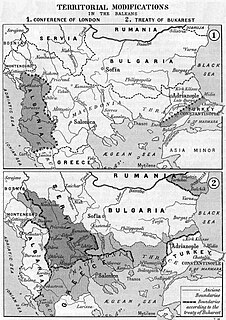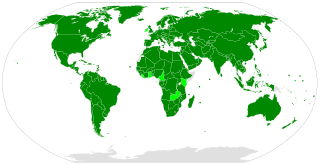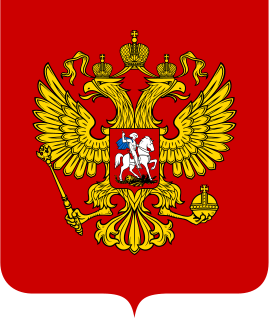
The Protocol on Environmental Protection to the Antarctic Treaty, also known as the Antarctic-Environmental Protocol, or the Madrid Protocol, is part of the Antarctic Treaty System. It provides for comprehensive protection of the Antarctic environment and dependent and associated ecosystems.

The Treaty of Berlin was signed on 13 July 1878. In the aftermath of the Russian victory against the Ottoman Empire in the Russo-Turkish War of 1877–1878, the major powers restructured the map of the Balkan region. They reversed some of the extreme gains claimed by Russia in the preliminary Treaty of San Stefano, but the Ottomans lost their major holdings in Europe. It was one of three major peace agreements in the period after the 1815 Congress of Vienna. It was the final act of the Congress of Berlin and included Great Britain and Ireland, Austria-Hungary, France, Germany, Italy, Russia and the Ottoman Empire. Germany's Otto von Bismarck was the chairman and dominant personality.

The Russo-Turkish War of 1877–1878 was a conflict between the Ottoman Empire and the Eastern Orthodox coalition led by the Russian Empire and composed of Bulgaria, Romania, Serbia, and Montenegro. Fought in the Balkans and in the Caucasus, it originated in emerging 19th-century Balkan nationalism. Additional factors included Russian goals of recovering territorial losses endured during the Crimean War of 1853–56, re-establishing itself in the Black Sea and supporting the political movement attempting to free Balkan nations from the Ottoman Empire.

The Second Balkan War was a conflict which broke out when Bulgaria, dissatisfied with its share of the spoils of the First Balkan War, attacked its former allies, Serbia and Greece, on 16 (O.S.) / 29 (N.S.) June 1913. Serbian and Greek armies repulsed the Bulgarian offensive and counter-attacked, entering Bulgaria. With Bulgaria also having previously engaged in territorial disputes with Romania and the bulk of Bulgarian forces engaged in the south, the prospect of an easy victory incited Romanian intervention against Bulgaria. The Ottoman Empire also took advantage of the situation to regain some lost territories from the previous war. When Romanian troops approached the capital Sofia, Bulgaria asked for an armistice, resulting in the Treaty of Bucharest, in which Bulgaria had to cede portions of its First Balkan War gains to Serbia, Greece and Romania. In the Treaty of Constantinople, it lost Edirne to the Ottomans.

Silistra is a town in Northeastern Bulgaria. The town lies on the southern bank of the lower Danube river, and is also the part of the Romanian border where it stops following the Danube. Silistra is the administrative center of the Silistra Province and one of the important towns of the historical region of Southern Dobrudzha.

The Treaty of Bucharest was concluded on 10 August 1913, by the delegates of Bulgaria, Romania, Serbia, Montenegro and Greece. The Treaty was concluded in the aftermath of the Second Balkan War and amended the previous Treaty of London, which ended the First Balkan War. About one month later, the Bulgarians signed a separate border treaty with the Ottomans, who had regained some territory west of the Enos-Midia Line during the second war.
Treaty of Bucharest may refer to the following treaties signed in Bucharest:

The Treaty of Bucharest (1918) was a peace treaty between Romania and the opposing Central Powers following the stalemate reached after the campaign of 1917. This left Romania isolated after Russia's unilateral exit from World War I.
The Reinsurance Treaty, was a diplomatic agreement between the German Empire and the Russian Empire that was in effect from 1887 to 1890. Only a handful of top officials in Berlin and St. Petersburg knew of its existence since it was top secret. The treaty played a critical role in German Chancellor Otto von Bismarck's extremely complex and ingenious network of alliances and agreements, which aimed to keep the peace in Europe and to maintain Germany's economic, diplomatic and political dominance.

The Romanian War of Independence is the name used in Romanian historiography to refer to the Russo-Turkish War (1877–78), following which Romania, fighting on the Russian side, gained independence from the Ottoman Empire. On April 16 [O.S. April 4] 1877, Romania and the Russian Empire signed a treaty at Bucharest under which Russian troops were allowed to pass through Romanian territory, with the condition that Russia respected the integrity of Romania. Consequently, the mobilization of the Romanian troops also began, and about 120,000 soldiers were massed in the south of the country to defend against an eventual attack of the Ottoman forces from south of the Danube. On April 24 [O.S. April 12] 1877, Russia declared war on the Ottoman Empire and its troops entered Romania through the newly built Eiffel Bridge, on their way to the Ottoman Empire. Due to great losses, the Russian Empire asked Romania to intervene. On July 24 [O.S. July 12] 1877, the first Romanian Army units crossed the Danube and joined forces with the Russian Army.

The Treaty of Accession 2005 is an agreement between the member states of European Union and Bulgaria and Romania. It entered into force on 1 January 2007. The Treaty arranged accession of Bulgaria and Romania to the EU and amended earlier Treaties of the European Union. As such it is an integral part of the constitutional basis of the European Union.

The Optional Protocol on the Sale of Children, Child Prostitution and Child Pornography is a protocol to the Convention on the Rights of the Child and requires parties to prohibit the sale of children, child prostitution and child pornography.

The Unification of Bulgaria was the act of unification of the Principality of Bulgaria and the province of Eastern Rumelia in the autumn of 1885. It was co-ordinated by the Bulgarian Secret Central Revolutionary Committee (BSCRC). Both had been parts of the Ottoman Empire, but the Principality had functioned de facto independently whilst the Rumelian province was autonomous and had an Ottoman presence. The Unification was accomplished after revolts in Eastern Rumelian towns, followed by a coup on 18 September [O.S. 6 September] 1885 supported by the Bulgarian Knyaz Alexander I. The BSCRC, formed by Zahari Stoyanov, began actively popularizing the idea of unification by means of the press and public demonstrations in the spring of 1885.

The Treaty of Bucharest of 1916 was signed between Romania and the Entente Powers on 4 /17 August 1916 in Bucharest. The treaty stipulated the conditions under which Romania agreed to join the war on the side of the Entente, particularly territorial promises in Austria-Hungary. The signatories bound themselves to keep secret the contents of the treaty until a general peace was concluded.

The Kingdom of Bulgaria participated in World War I on the side of the Central Powers from 14 October 1915, when the country declared war on Serbia, until 30 September 1918, when the Armistice of Thessalonica came into effect.

During World War II, the Soviet Union occupied and annexed several countries effectively handed over by Nazi Germany in the secret Molotov–Ribbentrop Pact of 1939. These included the eastern regions of Poland, as well as Latvia, Estonia, Lithuania, part of eastern Finland and eastern Romania. Apart from the Molotov–Ribbentrop Pact and post-war division of Germany, the USSR also occupied and annexed Carpathian Ruthenia from Czechoslovakia in 1945.
The Convention of Saint Petersburg may refer to several diplomatic agreements including

The Land Forces, Air Force and Naval Forces of Romania are collectively known as the Romanian Armed Forces. The current Commander-in-chief is Lieutenant General Daniel Petrescu who is managed by the Minister of National Defence while the president is the Supreme Commander of the Armed Forces during wartime.

The visa policy of Russia deals with the requirements which a foreign national wishing to enter the Russian Federation must meet to obtain a visa, which is a permit to travel to, enter, and remain in the country. Visa exemptions are based on bilateral or multilateral agreements. Russia has agreements with scores of countries whose citizens are either exempt from visas or can apply for a visa online (e-visa). Citizens of countries without such an agreement with Russia must obtain a visa in advance from a Russian diplomatic mission or visa centre.















